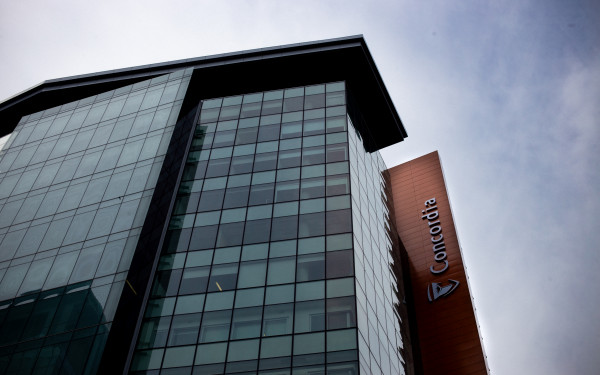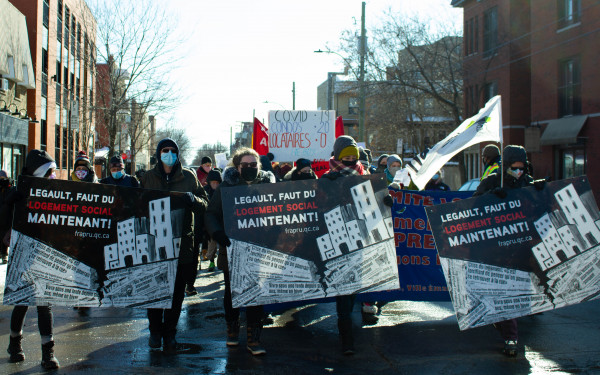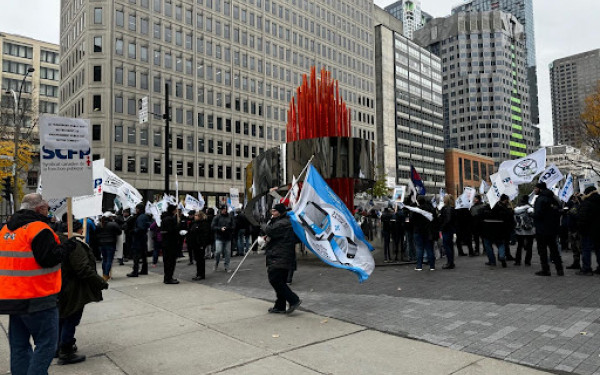Legault’s failure to protect public transit
Quebec’s resistance to fund public transit is detrimental for riders and climate
Every day, I leave my apartment in the freezing cold to queue up and take a bus, followed by the metro, followed by another bus, or, God forbid, the Concordia shuttle. The problem: as I approach my bus stop, I notice the line is unusually long on a daily basis.
The bus I was supposed to take is late, as are all the ones after it, which seems to be the new norm. Instead of a bus passing every five minutes, three to four busses pass every fifteen to twenty minutes, and they are all filled to the brim with passengers.
If this sounds all too familiar, it's not just you. According to data from the Sociéte de Transport de Montréal (STM), around a quarter of all buses are late. On average, only 78.3 per cent of all buses were on time in 2023 so far, and 74.9 per cent were on time in the month of September. Overall, buses this year are consistently more likely to be late than at the same time in 2022, and the yearly average has not been this low since 2019.
The potential reduction in the STM’s services came after Transport Minister Geneviève Guilbault announced that the province’s capital would only fund 20 per cent of the cost of public transit in Montreal. Since this, Guilbault has agreed to cover 70 per cent of the cost, but that is still less than what the city asked for.
Indeed, the ten regional transit agencies had asked for $300 million dollars, but the Quebec government is only offering to pay $265 million dollars, with $238 million dollars going to the city of Montreal. That is $35 million dollars less than what public transit agencies requested.
The number of people using public transit in the city has not gone back to pre-pandemic levels, a huge blow to the STM budget. Even with the new offer from Guilbault, the STM still has a hole in its budget. If the STM cannot find the money, it will have to cut back on services, although the transit provider claims that it should not impact buses or the metro.
For people who have to take multiple forms of public transit back to back, this tardiness compounds. A few minutes means missing a metro or maybe even the next bus, leading to even more wasted time and an increased risk of being late.
It is true that passengers can always leave earlier, but doing so can add 15 to 20 minutes to one's daily commute, which can add up to two hours every week. As someone who already spends around three hours commuting to Loyola campus every day, I would much rather spend those two hours sleeping or doing literally anything else besides waiting.
This decrease in quality is especially frustrating considering STM fairs are rising rapidly. The cost of a monthly pass jumped from $94 to $97 in July 2023—a three per cent increase—while single passes jumped from $3.50 to $3.75.
These hikes put additional pressure on commuters amidst a cost of living crisis, especially as the quality of services goes down. And with the news that the metro could begin closing at 11 p.m. and start opening at 9 a.m. on weekends, the future is looking bleak for those who rely on public transit.
While these changes are not guaranteed, it is not uncommon for people who work in healthcare or in the service industry to leave or come back from work at that time.These changes could force people to use their car, pay for a taxi or an Uber just to get to work, or quit their job altogether. Indeed, if people are forced to pay to get to and from work, it might no longer be financially viable to keep that job.
The reliance on cars over public transit also contributes significantly to the climate crisis. According to the Coalition Avenir Québec (CAQ) environmental plan, Quebec’s transportation sector accounted for 42.8 per cent of all greenhouse gas emissions (GHG) in 2020, with light vehicles accounting for 60 per cent of those emissions.
Public transit is essential to decreasing GHG emissions, with the STM reporting that public transit in Montreal helps avoid the emission of 2.3 million additional tonnes of greenhouse gases.
If the CAQ governments directed even a small amount of funds into public transit, it could help increase the number of buses on the road, increase the metro’s punctuality and could even lead to it closing later rather than earlier.
This article originally appeared in Volume 44, Issue 7, published November 28, 2023.







